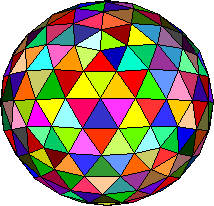| Holocracy | 2002-01-25 02:31 11 comments |
 by Flemming Funch by Flemming FunchIn trying to figure out what democracy really is and how it might work, I notice in the dictionary that the ending -cracy signifies "rule" or "government" by the agent specified by the initial element. Thus democracy, theocracy, technocracy. But, really, I'm not at all interested in being ruled by any agency other than the whole and my own sense of what is right within it. So, maybe we need a system that isn't a -cracy. Or, if anything, it should be a "Holocracy", a system that is governed by the whole, by itself. Holocracy would be the government of whole systems. And, searching on the web for that term, it incidentally leads me to some interesting folks who are using that word. For example REM and my friend Neutopia; Here are some quick quotes from some of these places, taken out of their contexts, but maybe providing us with some clues: Cherag's Library: "I have been starting to call it an experiment in a self generating, self harmonizing government called 'inclusive holocracy'. Where each individual recognizes himself and all others as the Totality emanating from a particular viewpoint. It helps to eliminate political problems which I don't care to deal with too much if I don't have to." REM: "REM, the nonprofit, civic enterprise described as a Holocracy is designed to support and facilitate the existing local governance of communities which choose to operate under these By-Laws.REM provides a process capable of assembling community resources, ascertaining community values, defining community vision, designing and implementing a wide variety of community programs approved by members. REM voluntarily assumes responsibility for convening and mobilizing community with the goal of improving the quality of community life, and voluntarily accepts accountability for its actions. REM as a Holocracy is empowered only by the freely given consent of its members." Neutopia: "Holocracy is the total system of whole things in nature, the original whole which is made up of the smaller whole parts." Civil Society's Emerging Role in Global Governance: "Basic levels of life processes in communities are fundamental in importance but higher levels of complexity and integration require a deeper level of reflection and analysis and are more significant. As more diverse elements comprise a system, the diversity of contribution becomes a more significant consideration. At these higher levels of capacity for wholeness, what constitutes a critical mass is not the numbers of one element but the diversity of critical elements. This points to a need to expand advocacy to a "holocracy" the affirmation of wholes that envelope fundamental issues and concerns and transcend them to more inclusive wholes that define Public Interest translating the principle of subsidiarity and solidarity at various levels of the hierarchy of wholes, that are parts of more encompassing and communing wholes. This phenomenon has expanded the role of civil society organizations to defining norms for more complex systems and move from resistance and advocacy to alternative-building and creative counterparting." The City, Sustainability and Appropriate Technology: "We can call this way of carrying out politics “Local Action,” according to the Brazilian physicist Augusto de Franco (1995), which “is a contemporary commonplace action, developed to make viable the collaboration or a mutual service between men and women which want to live in the present in a concrete community.” All of this is part of a process which generates the construction of a mutually binding “Humanity,” decentralized and with goals in common. “In this way, the Global Humanity is slowly constructed through the development of ethical-political relationships which can only thrive in spaces of Local Action.” This new way of carrying out politics can be called “Holocracy,” that is, “a common government” or “a government for each and every person,” (Acción Local: una nueva polÃtica de la contemporaneidad, Augusto de Franco, Brazil, 1995)." So, hmmm, common to these perspectives seem to be that it includes local action and some sort of system or process that feeds that into a bigger whole. A bottom up, decentralized approach, but one that is guided by a shared humanity and the common interests of the whole. |